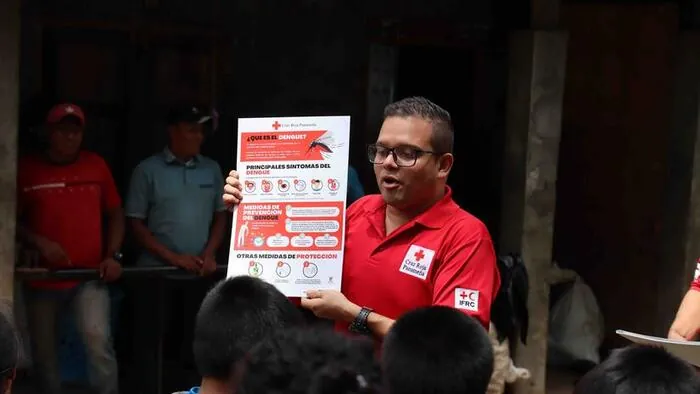
The Red Cross Takes Strong Action Against Unprecedented Dengue Outbreak in Central America: Here’s What You Need to Know!
2024-12-23
Author: Ming
As the mosquito-borne dengue fever continues to spread at an alarming rate in Central America, the regional crisis has reached unprecedented levels, prompting a robust response from the Red Cross. On the occasion of the International Day of Epidemic Preparedness 2024, we delve into the shocking statistics and explore the comprehensive strategies being deployed to address this escalating health emergency.
Dengue fever has historically been a significant public health threat in Latin America, with cyclical outbreaks occurring every three to five years. However, 2023 has marked a particularly grim milestone, with more than 12.7 million suspected dengue cases reported in the Americas, shattering previous records. In Central America and Mexico alone, over 17,000 new suspected cases emerged just within the last week of November, amounting to a staggering 100 cases per hour— that translates to a 198% increase compared to the five-year average!
The crisis is exacerbated by factors tied to climate change. Climate shifts manifesting as extreme temperatures and intensifying weather patterns—including hurricanes, heat waves, and recent storms—are forcing vulnerable populations to adapt in perilous ways. Many families resort to improper water storage practices due to poverty and inadequate sanitation services, inadvertently creating breeding grounds for the female Aedes aegypti mosquitoes responsible for transmitting the dengue virus.
In this dire situation, the National Red Cross Societies in Central America are stepping up with a multi-faceted response plan aimed at education and prevention. Since the beginning of 2023, local Red Cross teams have launched six dengue response operations, supported by the Disaster Response Emergency Fund (IFRC-DREF). These initiatives not only address immediate needs but also pave the way for proactive measures against future outbreaks.
Community Empowerment: A Key to Success
Central to the Red Cross's strategy is the empowerment of local communities to combat dengue effectively. Volunteers are actively engaging with residents, conducting educational sessions to highlight the urgent need to eradicate mosquito breeding sites. They implement hands-on activities aimed at practical solutions—such as eliminating stagnant water, fumigating, and cleaning neglected areas.
The Red Cross provides essential supplies like safe water storage containers, home cleaning kits, repellents, mosquito nets, and water filters, targeting at-risk groups including pregnant women and children under five.
Building Resilience for the Future
In addition to immediate relief efforts, the Red Cross places tremendous emphasis on long-term training and capacity-building initiatives. Community health committees are being established, and local health workers trained in clinical management of dengue, better equipping them to serve in areas where medical resources are limited.
This proactive approach has shown promising results. Reports indicate a notable decrease in dengue cases in areas like Panama, attributed to joint efforts by health ministries, community members, and organizations like the Red Cross. Local accounts also suggest that awareness campaigns are beginning to bear fruit.
The Road Ahead: Challenges Remain
Despite this progress, the battle against dengue is far from over. The situation underscores the pressing need for continued innovation in public health strategies, particularly in light of evolving climatic and social dynamics that threaten community health. Engaging communities, improving sanitary conditions, and bolstering health systems are essential to curb future outbreaks.
The Red Cross's unwavering commitment amidst this public health crisis not only highlights their crucial role in immediate epidemic response but also emphasizes the importance of community resilience in navigating the challenges posed by dengue fever. Will these initiatives be enough to sustain the fight against dengue in the long run? Only time will tell, but one thing is certain: the fight against dengue is a journey that requires all hands on deck. Stay tuned for more updates on this evolving public health story!




 Brasil (PT)
Brasil (PT)
 Canada (EN)
Canada (EN)
 Chile (ES)
Chile (ES)
 Česko (CS)
Česko (CS)
 대한민국 (KO)
대한민국 (KO)
 España (ES)
España (ES)
 France (FR)
France (FR)
 Hong Kong (EN)
Hong Kong (EN)
 Italia (IT)
Italia (IT)
 日本 (JA)
日本 (JA)
 Magyarország (HU)
Magyarország (HU)
 Norge (NO)
Norge (NO)
 Polska (PL)
Polska (PL)
 Schweiz (DE)
Schweiz (DE)
 Singapore (EN)
Singapore (EN)
 Sverige (SV)
Sverige (SV)
 Suomi (FI)
Suomi (FI)
 Türkiye (TR)
Türkiye (TR)
 الإمارات العربية المتحدة (AR)
الإمارات العربية المتحدة (AR)